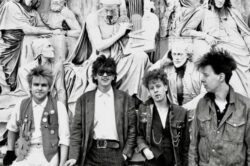
“Musicians start out thinking they’re going to change the world when really it’s the people who make the change. The music just provokes the reaction.” – Mike Peters.
Most people who knew anything about Mike Peters expected that he would not live to a ripe old age. Several bouts with cancer saw to that, with the final blow coming on April 29, 2025. The villain was Richter’s Syndrome, which somehow sounds less evil than cancer, but it was quite deadly.
Peters was the driving force behind The Alarm, a band that was a darling of the critics and had a devoted following but never managed to enjoy the limelight that shined on contemporaries like U2. From the band’s inception, over the span of seven years, they released five LPs and one EP, which became the bedrock of their output. Peters would carry on with numerous reboots of The Alarm, some under his own name, but the energy and magic of the early punk rock band were never duplicated. Obscurity came calling in a sense, but Peters managed to prevent that unwelcome guest from overstaying by establishing direct connections with his fans around the world. These contacts became the basis for the Mike Peters Organisation, whose members were invited to his home in Rhyl, Wales, for an annual event called “The Gathering.”
When The Alarm released a retrospective boxed set of its complete works in 2000, Peters agreed to record a song and personal dedication for everyone who requested one. He expected to do a few hundred and ended up recording several thousand.
Peters was born in North Wales in 1959 and grew up living at the Crescent Hotel in Rhyl with Alarm band member Eddie MacDonald. A track on one of the later albums – ‘On Edward Henry Street’ – describes that time in his life.
Before The Alarm, Peters cobbled together friends who barely knew how to play their instruments in various punk rock bands, starting with The Toilets in 1977. Peters was known then as “Eddie Bop”, and his bandmates were Glyn Crossley (aka Steve Shock), Richard “O’Malley” Jones (aka Bo Larks) and Nigel Buckle (aka Des Troy). The following year, they called themselves Quasimodo, adding guitarist Dave Kitchingman (aka Dave Sharp) and Karl Wallinger (World Party) on keys. They were actually one of the first tribute bands, choosing to play note-by-note covers of The Who’s “Live at Leeds” album. The following year found them renamed again as Seventeen, with Peters joined by his old roomie MacDonald, Sharp and Buckle. The band released a single (‘Don’t Let Go’ b/w ‘Bank Holiday Weekend’), but the next year became Alarm Alarm, taking the name of one of the songs Peters wrote for The Toilets. The bands Duran Duran and Talk Talk also suffered from anadiplosis, which led English disc jockey John Peel to joke on the BBC about renaming his show John Peel John Peel. Not long after that comment was made, one of the Alarms was discarded.

Blending working-class roots with an overt political messaging, their music had a dynamic post-punk sensibility, though they often opened shows acoustically before cranking up the amps. Peters always had deep roots in his homeland, which decried the gradual erosion of Welsh culture and language. The band’s calling card was a gut-level sincerity, exhorting their listeners to stand up to negative forces in the world and start the change within themselves. Theirs was the kind of music young people desired, challenging all the factors in their lives and culture which sought to divide rather than unify.
Peters could never duplicate the classic indelible period of the ‘80s Alarm with that passion, energy, and, most of all, urgency, although some would say 2010’s “Direct Action” came close. The Alarm was defiantly into big statements. Listen to how many times words like hope, faith, strength and spirit popped up in the lyrics, and also note how many of their songs were about the confrontation of authority and agonising over the potential conforming of their young lives.
The Alarm was also a killer live band. At their gigs, the crowds would lustily sing every song and pump their fists in the air with abandon. They were that convincing. “Raw,” when blasted at full volume, will remind you about just how moving anthemic rock can be and just how easily a great song can sweep you off to another plateau. Powerful anthems like ’68 Guns’ and ‘Strength’ defined punk rock in their best years. Peters’ voice of defiance and commanding stage presence was at the heart of it all.

Peters once said: “Musicians start out thinking they’re going to change the world when really it’s the people who make the change. The music just provokes the reaction.” For me, the best Alarm album was the first. “Declaration” introduced a band with the wild, fervent, plaintive rasp of their impassioned vocalist, delivering lyrics that were polemically charged but never overly strident in approach. ‘Shout To The Devil,’ ‘Howling Wind,’ ‘Sixty-Eight Guns,’ ‘Blaze of Glory,’ and ‘We Are The Light’ all crackle with an earnest and vital energy that, at its best more than rivalled the releases of other socially-conscious, guitar-driven bands like U2 and Big Country. Peters once fronted a reformed Big Country a few years after that band’s leader, Stuart Adamson, died from hanging himself in his hotel room in Hawaii in the aftermath of an alcohol bender.
The Alarm broke up in 1991 when Peters left the band after a show at Brixton Academy. He continued to record and tour despite multiple relapses from cancer. He played at the world’s highest elevations, performing at “The Highest Ever Concert on Land” at 18,500 feet on Mt. Everest in 2007 and at 19,380 feet at the summit of Kilimanjaro in 2009. Along with his wife, Jules, he co-founded “Love Hope Strength,” a music-driven cancer charity that revolutionised awareness and action around stem cell donation.

“Mike lived as he sang — with passion, courage, and an unshakeable belief in the power of people to make a difference,” said Jules Peters at his funeral in Dyserth, Wales. “His voice may be still, but his message and music will never fade.”
Bob Harris of “Sounds of the Seventies” on Radio 2 put it best when he said, “Mike is mine, he is yours, and he is pure best friend today, tomorrow and in all our future days.”
The funeral was a musical tribute, as Peters would have wanted. His sons, Dylan and Evan, carried a casket containing their father’s ashes to the Parish Church of St Bridget and St Cwyfan, and the congregation sang ‘Stand by Me.’ Evan performed ‘Wonderwall,’ a song he and his father frequently played together. Long-time friend and collaborator Billy Duffy of Coloursound did a rendition of ‘Fade In Fade Out Fade Away.’ Dafydd Iwan of the folk band Ar Log sang the stirring anthem ‘Yma o Hyd’ (Still Here), a song synonymous with resilience and national pride, qualities embodied by Mike Peters throughout his life.



Lovely tribute. Thank you.
RIP Mike. Nice piece